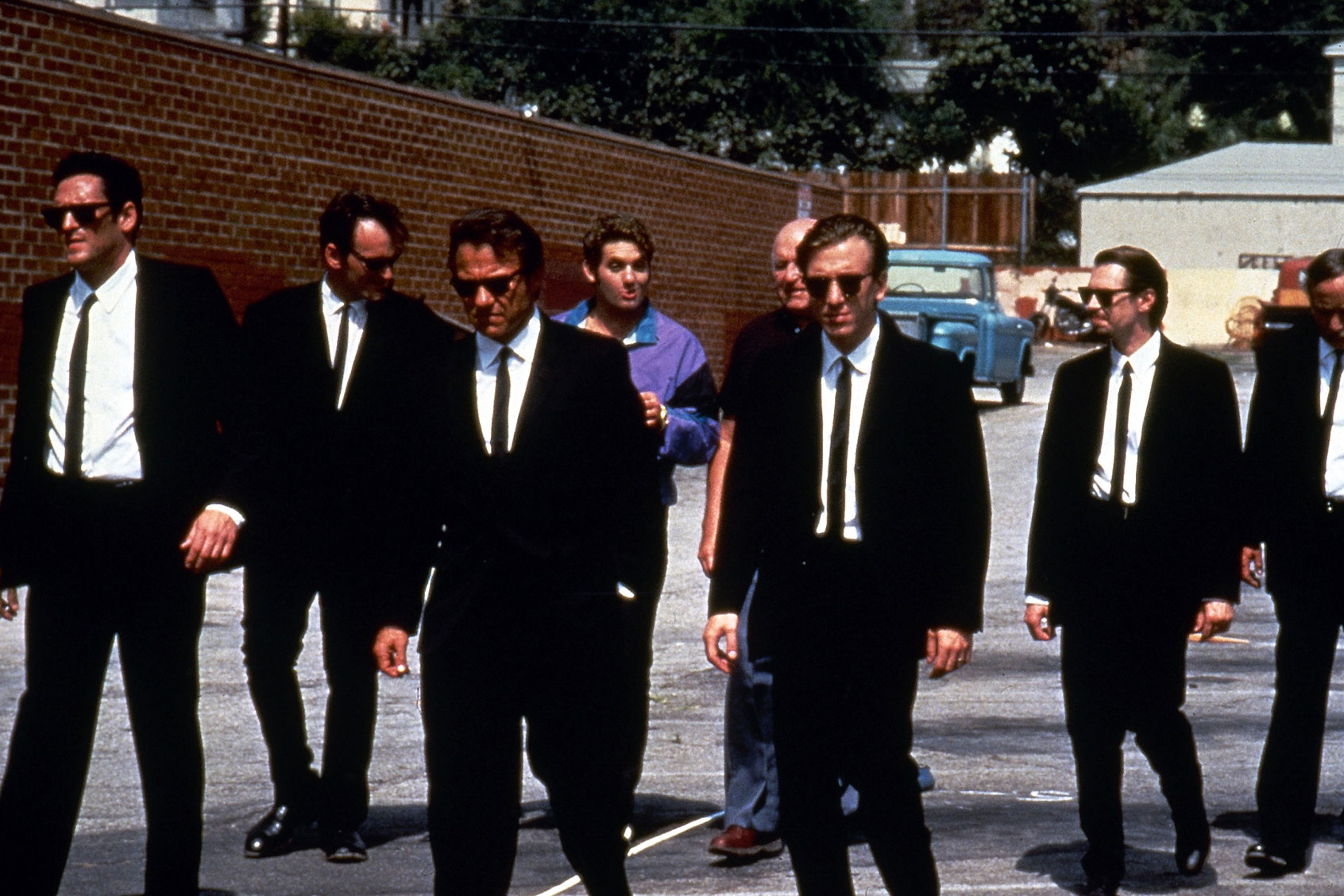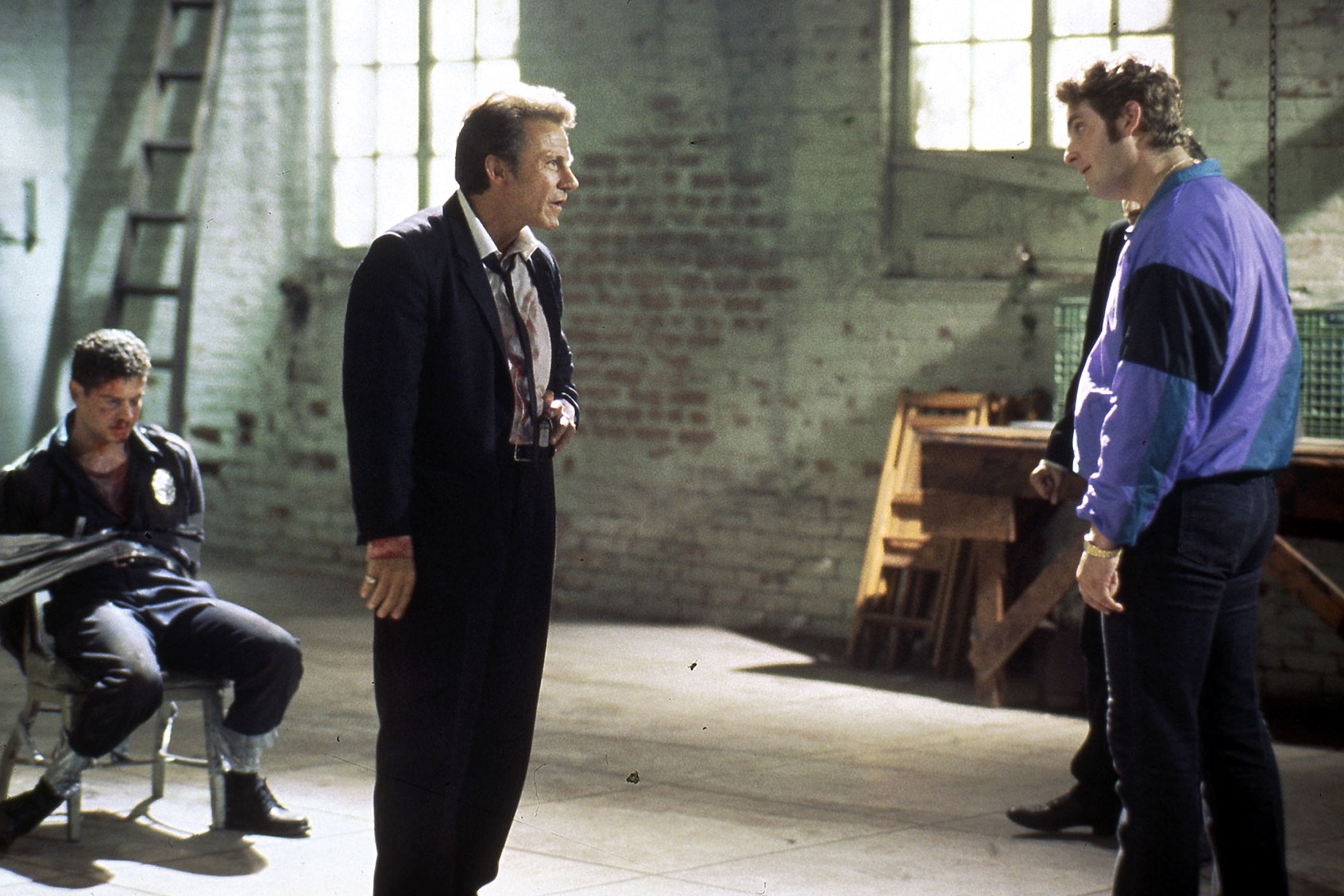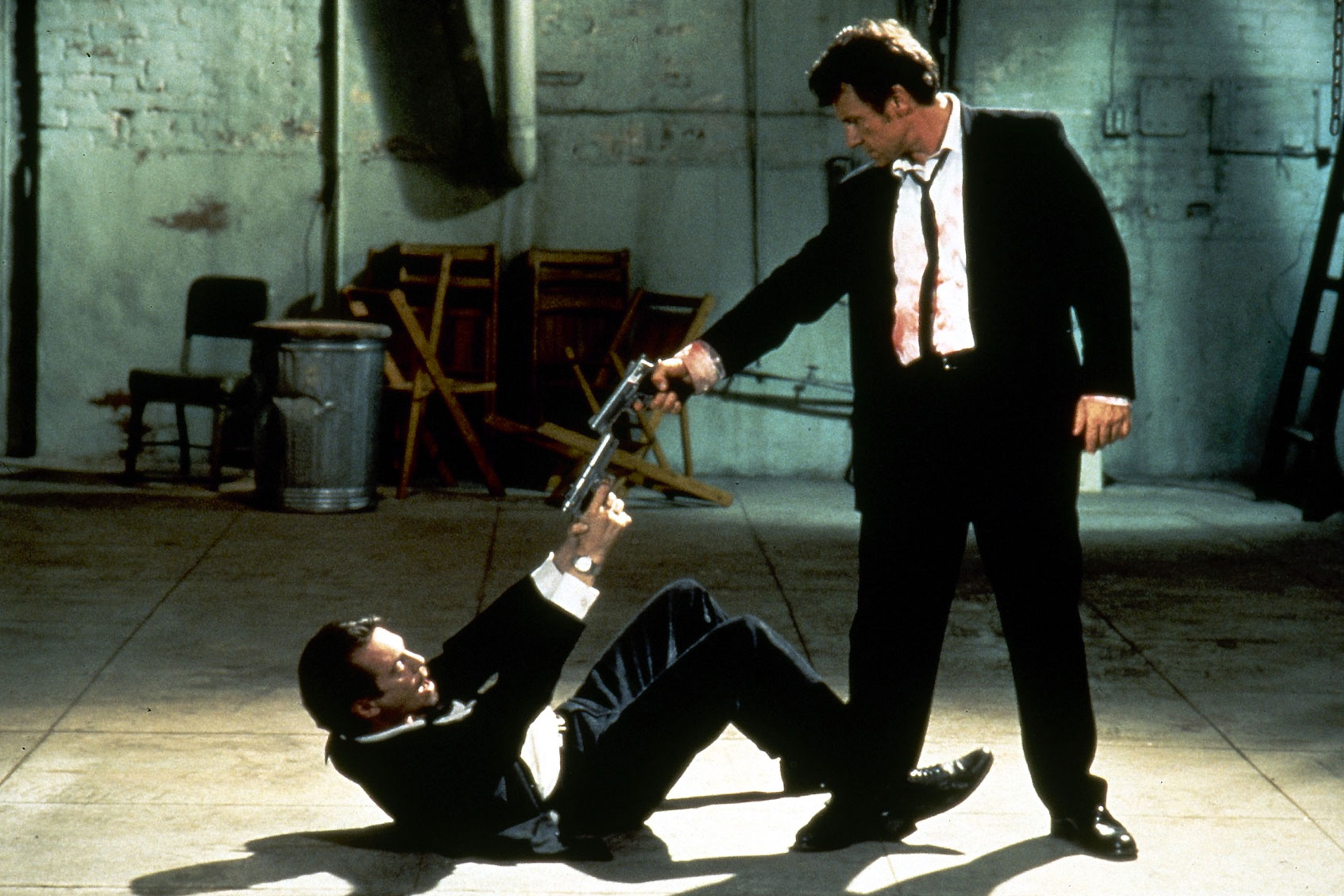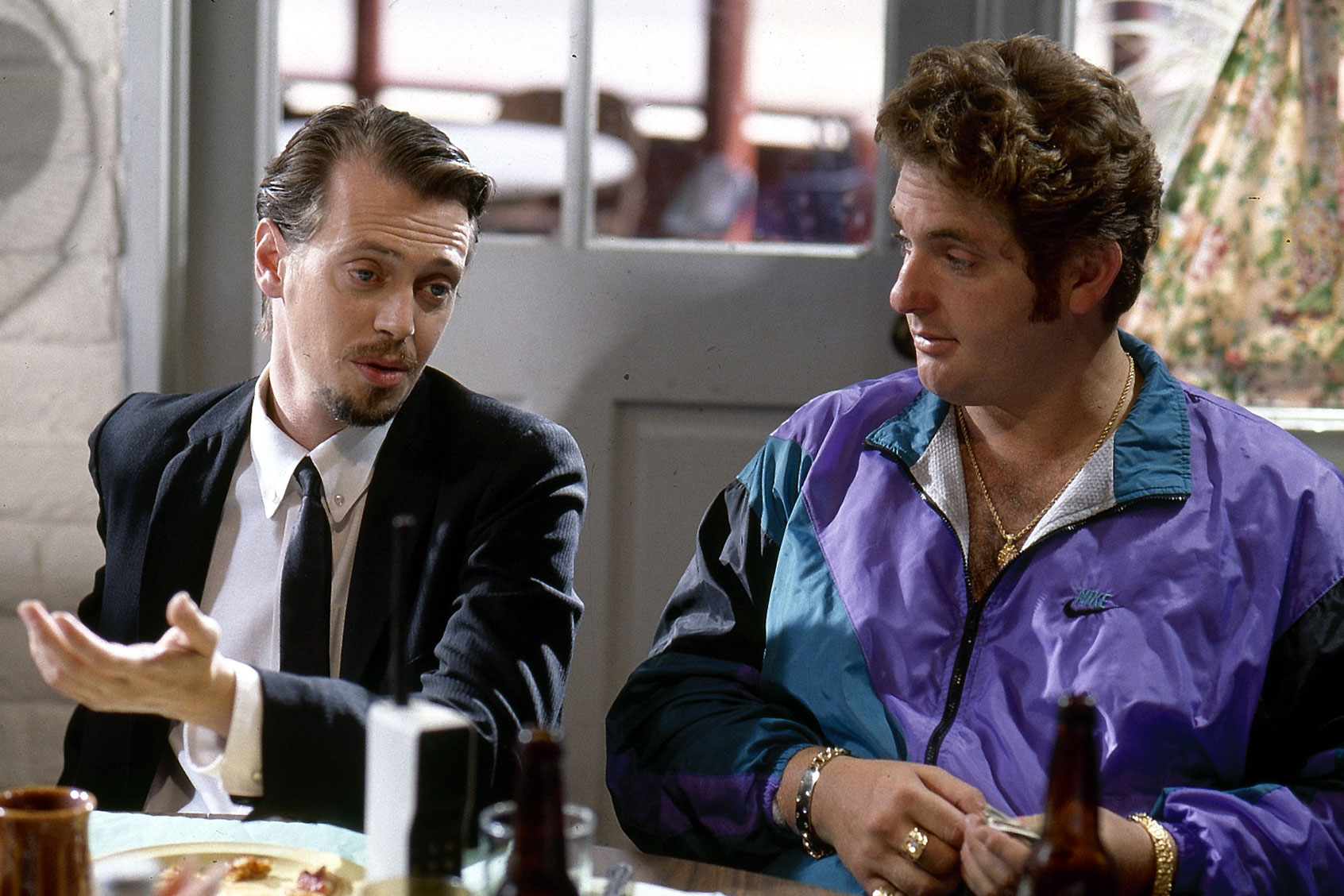Over a black screen we hear a voice say, “Let me tell you what ‘Like A Virgin’s’ about. It’s a song about a girl who digs a guy with a big dick. The entire song is a metaphor for big dicks.”
“Reservoir Dogs” represents a changeover in power as the Baby boom generation’s vise-grip on the culture starts to give way to the burgeoning Generation X.
And just like that a revolution was sparked. The voice belongs to Mr. Brown, a member of a gang of jewel thieves, portrayed by writer-director-costar Quentin Tarantino. The movie is “Reservoir Dogs,” a booby-trapped heist-gone-wrong postmortem released 30 years ago that turned out to be an adrenaline shot to the heart of the American Independent film movement. Before “Dogs,” beginning with John Cassavetes’ “Shadows” in 1959, independent American movies were viewed as scrappy, stitched-together artistic expressions that posed no real threat to the 800-pound gorilla that was the Hollywood studio system. The fact that “regional authenticity” was stitched into these movies’ DNA was seen more as a liability than an asset. And whenever an indie movie managed to crack the mainstream (“Sweet Sweetback’s Baadasssss Song,” “Pink Flamingos,” “The Return of the Secaucus Seven”) they were viewed as anomalies.
That all changed with “Reservoir Dogs.” Tarantino decided to look to the recent past — particularly the discarded detritus of the 1970s — in order to pave a way for the future. “Reservoir Dogs” used the outline of a jewel-heist-gone-horribly-wrong story in order to get at what it was really all about: talk. The movie is about the babbling brook of obsessive conversations over the things that really matter – pop culture – and how they can reveal one’s humanity (or, lack thereof).
This is on full display in the movie’s opening circular sequence as the Dogs share their opinions on the work of Madonna. They are about to pull off a major crime but, at the moment, the most important thing to them is which era of Madonna’s work was her best. (“I used to like her early stuff — “Borderline.” When she got off on that “Papa Don’t Preach” phase, I tuned out!”) At one point, co-ringleader Nice Guy Eddie (Chris Penn) asks if anyone else has been listening to K-Billy’s Super Sounds of the ’70s. Songs like Little Tony DeFranco and the DeFranco Family’s “Heartbeat – It’s a Love Beat” and “The Night the Lights Went Out in Georgia” get mentioned and dissected. (It turns out that Nice Guy didn’t realize that Vicki Lawrence was the one who shot Andy. He thought it was the cheating wife.) All this crosstalk added up to a new world vision where everything old is new again.
 Reservoir Dogs (Lionsgate)As the scene ends we get our first needle drop. We first hear the voice of K-Billy Super Sounds of the ’70s, Steven Wright as he name-checks songs like The Partridge Family’s “Doesn’t Somebody Want to Be Wanted” and Edison Lighthouse’s “Love Grows Where My Rosemary Goes.” Then, we hear the rock groove of the George Baker Selection’s “Little Green Bag,” a minor hit from 1971. The song’s reference to a “bag on the track” slyly suggests the bounty they are about to get. As the song plays, the actors skulk toward the camera in slow motion in what amounts to the coolest fucking title sequence you’ve ever seen powered by the coolest fucking song you’ve ever heard. It’s shocking when the groove is interrupted by the immediacy of the story as we are confronted with the sweaty reality of Mr. Orange (Tim Roth), gut-shot and writing in pain in the backseat of a car, and Mr. White (Harvey Keitel) as they make a fast getaway.
Reservoir Dogs (Lionsgate)As the scene ends we get our first needle drop. We first hear the voice of K-Billy Super Sounds of the ’70s, Steven Wright as he name-checks songs like The Partridge Family’s “Doesn’t Somebody Want to Be Wanted” and Edison Lighthouse’s “Love Grows Where My Rosemary Goes.” Then, we hear the rock groove of the George Baker Selection’s “Little Green Bag,” a minor hit from 1971. The song’s reference to a “bag on the track” slyly suggests the bounty they are about to get. As the song plays, the actors skulk toward the camera in slow motion in what amounts to the coolest fucking title sequence you’ve ever seen powered by the coolest fucking song you’ve ever heard. It’s shocking when the groove is interrupted by the immediacy of the story as we are confronted with the sweaty reality of Mr. Orange (Tim Roth), gut-shot and writing in pain in the backseat of a car, and Mr. White (Harvey Keitel) as they make a fast getaway.
So, what is the point of Tarantino using forgotten minor hits from the early ’70s to populate his new-style, old-fashioned genre heist movie? There are a couple of factors at play.
First of all, “Reservoir Dogs” represents a changeover in power as the Baby boom generation’s vise-grip on the culture starts to give way to the burgeoning Generation X. The previous year had seen the release of Richard Linklater’s seminal Gen-X non-narrative triumph “Slacker.” Now, with “Dogs,” it looked as if the children of the Boomers were stepping out and letting their voices be heard. For the longest time it looked as if the gatekeeping Boomers were embarrassed by the 1970s and all that it encompassed – Nixon, disco, the energy crisis, Punk, the fall of Saigon, bell-bottoms. They much preferred to move headlong into the nihilism of the go-go ’80s. Just as depicted in “Boogie Nights” (another movie drenched in ’70s details), the changeover from the free-spirited days of analog to the calculating harshness of video could almost be a stand-in for Gen-X’s feeling of dislocation as the creature comforts of their youth gives way to career uncertainty and distrust in institutions.
[Tarantino] stages a scene of taboo-smashing violence only to turn it into a pop reverie.
Another thing that is occurring is the reclaiming and repurposing of one’s youth. Just as the Movie Brats of the New Hollywood era (Spielberg, Scorsese, Lucas) retooled the serials, TV shows, and studio movies that shaped their sensibilities, the latchkey kids of the ’70s were doing the same. They not only grew up on ’70s classics like “The Godfather” (1972), “Taxi Driver” (1976), and “Star Wars” (1977), but also gorged on reruns of classic serials and TV shows like “Leave it to Beaver,” “The Honeymooners,” and “Green Acres.” It was a witch’s brew of pop culture.
But Tarantino went a little deeper. He not only revered the stalwarts of the New Hollywood, but he also held in equal esteem grindhouse renegades like Jack Hill, John Carpenter, and Tobe Hooper. As the New Hollywood gave way to the all-climax-all-the-time blockbuster ’80s, the Gen-X kids saw the calcification of American movies. They turned into one, continuous blockbuster. The thrill was gone. So by going back to their youth, the Gen-X filmmakers were looking to do nothing less than reenergize American movies. They wanted to make blockbusters, too. They wanted to make them with a cutting edge.
 Kirk Baltz, Harvey Keitel and Chris Penn “Reservoir Dogs” (Lionsgate)This is never more apparent than in the “Reservoir Dogs” centerpiece sequence: the ear-slicing torture scene. The gang’s warehouse rendezvous has emptied except for a passed-out Mr. Orange, a tied-up police officer (Kirk Baltz), and a prowling Mr. Blonde (Michael Madsen), a taciturn Lee Marvin-ish type whose cool demeanor conceals a hair-trigger temper. Mr. Blonde is not really interested in talking to the cop. He’d rather torture him because he finds that amusing. After taking out a straight razor, he turns on the radio to K-Billy Super Sounds of the ’70s. The DJ introduces the Stealers Wheel hit single “Stuck in the Middle With You.” As the song starts to play – with its syncopated hand claps and cowbell, countrfied guitar picking, Dylan-esque vocals – Mr. Blonde starts to dance around the room. As he begins to cut and torture the cop you want to look away in horror, but don’t because the scene is so galvanizingly “cool.” You realize Tarantino is at once on everyone’s side and no one’s side. He stages a scene of taboo-smashing violence only to turn it into a pop reverie. It’s shock theater with a laid-back groove.
Kirk Baltz, Harvey Keitel and Chris Penn “Reservoir Dogs” (Lionsgate)This is never more apparent than in the “Reservoir Dogs” centerpiece sequence: the ear-slicing torture scene. The gang’s warehouse rendezvous has emptied except for a passed-out Mr. Orange, a tied-up police officer (Kirk Baltz), and a prowling Mr. Blonde (Michael Madsen), a taciturn Lee Marvin-ish type whose cool demeanor conceals a hair-trigger temper. Mr. Blonde is not really interested in talking to the cop. He’d rather torture him because he finds that amusing. After taking out a straight razor, he turns on the radio to K-Billy Super Sounds of the ’70s. The DJ introduces the Stealers Wheel hit single “Stuck in the Middle With You.” As the song starts to play – with its syncopated hand claps and cowbell, countrfied guitar picking, Dylan-esque vocals – Mr. Blonde starts to dance around the room. As he begins to cut and torture the cop you want to look away in horror, but don’t because the scene is so galvanizingly “cool.” You realize Tarantino is at once on everyone’s side and no one’s side. He stages a scene of taboo-smashing violence only to turn it into a pop reverie. It’s shock theater with a laid-back groove.
The most significant aspect of the “Reservoir Dogs” soundtrack is the fact that it even had one.
There are a few other notable needle drops throughout the movie. Following the bravura opening-credit sequence, members of the gang start to reassemble at a warehouse, including the overcaffeinated Mr. Pink (Steve Buscemi), who insists there is a “rat” in the gang. When Mr. Blonde shows up with a tied-up cop in his trunk, the three men proceed to kick and punch the officer. The scene is set to Joe Tex’s “I Gotcha,” an un-PC piece of funk that’s all about Tex demanding a woman satisfy his urges. As the scene goes on, the song is recontextualized into a taunting cackle at the police officer’s helplessness.
During the movie’s most extended flashback sequence, we are shown who the infiltrator is and how he worked his way into the gang. In a brief scene in his apartment we watch him get ready as Sandy Rogers’ “Fool for Love” plays on the radio. The unmistakable country song is jarring as it breaks from the AM Gold that has populated the rest of the soundtrack. In a scene where several of the Dogs are driving around, Blue Swede’s 1974 horn-inflected, uptempo cover of B.J. Thomas’ “Hooked On a Feeling” can be heard on the radio. The song is used as a backdrop as they discuss the merits of Pam Grier versus “Get Christie Love!”
 Steve Buscemi and Harvey Keitel in “Reservoir Dogs” (Lionsgate)The final significant needle drop comes at the end as Mr. White discovers he has misplaced his trust in the wrong person. Choosing to dispense with a form of justice that will seal both their fates, the movie does a hard cut to black followed by a title card that reads, “Written and Directed by Quentin Tarantino.” Then, Harry Nilsson’s calypso-flavored ditty “Coconut” starts to play. With its refrain of “Is there something for my bellyache, doctor” (a callback to Mr. Orange’s unfortunate condition), the song is like one final rimshot of pop ecstasy.
Steve Buscemi and Harvey Keitel in “Reservoir Dogs” (Lionsgate)The final significant needle drop comes at the end as Mr. White discovers he has misplaced his trust in the wrong person. Choosing to dispense with a form of justice that will seal both their fates, the movie does a hard cut to black followed by a title card that reads, “Written and Directed by Quentin Tarantino.” Then, Harry Nilsson’s calypso-flavored ditty “Coconut” starts to play. With its refrain of “Is there something for my bellyache, doctor” (a callback to Mr. Orange’s unfortunate condition), the song is like one final rimshot of pop ecstasy.
Possibly the most significant aspect of the “Reservoir Dogs” soundtrack is the fact that it even had one. Due to their budgetary limitations, indie movies rarely received companion soundtrack albums. They were the province of big-studio releases. In the early 1980s, when MTV and Hollywood entered a synergistic relationship, soundtracks were viewed as a vital marketing tool. It seemed as if every major studio release got one. The hope being that a hit single would help the box office. It wasn’t just movies like “The Big Chill” (1983), “Footloose” (1984), and “Less Than Zero” (1987) that got their own platinum-selling soundtracks. Unlikely movies like “Legal Eagles” (1986) and “Scrooged” (1988) also had soundtracks. That all changed after “Reservoir Dogs.” Before “Dogs,” indie movie soundtracks consisted mostly of plaintive scores and maybe one or two mood-setting songs. After “Dogs,” indie movies were viewed as a gateway to the burgeoning Alternative youth music market. Movies like “Amongst Friends” (1993), “Clerks” (1994), and “Trainspotting” (1996) had notable soundtracks. Indie movies were now ready to rock.
 Tim Roth, Harvey Keitel, Steve Buscemi and Michael Madsen in “Reservoir Dogs” (Lionsgate)The impact of “Reservoir Dogs” the movie and soundtrack were not immediately felt like, say, that of “Saturday Night Fever.” But there is no denying its lasting legacy. The following year would bring us Richard Linklater’s spirit-of-’76 all-night-long chronicle “Dazed and Confused,” with its classic-rock soundtrack used to connect the disaffected kids of the ’70s with the Grunge generation of the ’90s. The Gen-X touchstone “Reality Bites” (1994) gave unironic shout-outs to Peter Frampton and The Knack’s power-pop classic “My Sharona.” The biting Australian rom-com “Muriel’s Wedding” (1995) used the music of ABBA (arguably the most important pop band of the ’70s) for its romantic bedrock. (the movie’s soundtrack is more or less responsible for our continuous appreciation of ABBA.) Danny Boyle’s junkie-without-a-cause chronicle “Trainspotting” (1996) took its tone from ’70s glam classics like Lou Reed’s “Perfect Day” and especially Iggy Pop’s thunderous “Lust for Life.” Movies like “Crooklyn” (1994) and “Dead Presidents” (1995) highlighted R&B and Soul classics from the early-’70s. Disco finally got the long overdue respect it deserved with Whit Stillman’s swirling, talk-and-dance fest “The Last Days of Disco” (1998). Cameron Crowe’s band-on-the-run rock-crit memoir “Almost Famous” (2000) used early-’70s rock (Zepplin, the Allman brothers, Elton John) as a way of chronicling the slow death of a revolution. Then, there’s Paul Thomas Anderson’s porn-world epic “Boogie Nights,” which uses a wideranging soundscape that is generous enough to include everything from the pop beauty of K.C. and the Sunshine Band and the Emotions to the end-of-the-world power ballad doom of Night Ranger as a way of depicting the transition from the free-spirited ’70s to a new world where technological advances were mistaken for human connections. Even the MCU got in on the ’70s revival when the first (and best) installment of “Guardians of the Galaxy” used a cassette tape of AM Gold staples (including the lost classic “Come and Get Your Love” by Redbone) as a Monaurual counterpoint to the intergalactic action.
Tim Roth, Harvey Keitel, Steve Buscemi and Michael Madsen in “Reservoir Dogs” (Lionsgate)The impact of “Reservoir Dogs” the movie and soundtrack were not immediately felt like, say, that of “Saturday Night Fever.” But there is no denying its lasting legacy. The following year would bring us Richard Linklater’s spirit-of-’76 all-night-long chronicle “Dazed and Confused,” with its classic-rock soundtrack used to connect the disaffected kids of the ’70s with the Grunge generation of the ’90s. The Gen-X touchstone “Reality Bites” (1994) gave unironic shout-outs to Peter Frampton and The Knack’s power-pop classic “My Sharona.” The biting Australian rom-com “Muriel’s Wedding” (1995) used the music of ABBA (arguably the most important pop band of the ’70s) for its romantic bedrock. (the movie’s soundtrack is more or less responsible for our continuous appreciation of ABBA.) Danny Boyle’s junkie-without-a-cause chronicle “Trainspotting” (1996) took its tone from ’70s glam classics like Lou Reed’s “Perfect Day” and especially Iggy Pop’s thunderous “Lust for Life.” Movies like “Crooklyn” (1994) and “Dead Presidents” (1995) highlighted R&B and Soul classics from the early-’70s. Disco finally got the long overdue respect it deserved with Whit Stillman’s swirling, talk-and-dance fest “The Last Days of Disco” (1998). Cameron Crowe’s band-on-the-run rock-crit memoir “Almost Famous” (2000) used early-’70s rock (Zepplin, the Allman brothers, Elton John) as a way of chronicling the slow death of a revolution. Then, there’s Paul Thomas Anderson’s porn-world epic “Boogie Nights,” which uses a wideranging soundscape that is generous enough to include everything from the pop beauty of K.C. and the Sunshine Band and the Emotions to the end-of-the-world power ballad doom of Night Ranger as a way of depicting the transition from the free-spirited ’70s to a new world where technological advances were mistaken for human connections. Even the MCU got in on the ’70s revival when the first (and best) installment of “Guardians of the Galaxy” used a cassette tape of AM Gold staples (including the lost classic “Come and Get Your Love” by Redbone) as a Monaurual counterpoint to the intergalactic action.
Want a daily wrap-up of all the news and commentary Salon has to offer? Subscribe to our morning newsletter, Crash Course.
As it turned out “Reservoir Dogs” was merely a sneak preview of Tarantino’s grand vision of reclaiming the ’70s. In his crime triptych “Pulp Fiction,” he pulled off a sleight-of-hand miracle by resurrecting the career of the most indelible star from that decade: John Travolta. In doing so, Tarantino did nothing less than resurrect the spirit of ’70s American filmmaking. Along with his fellow Gen-X filmmakers (P.T. Anderson, Wes Anderson, Noah Baumbach, Spike Jonze, Richard Linklater, Doug Liman), they helped to usher in a New New Hollywood. Before “Reservoir Dogs,” American indie movies traveled on an inferior track to mainstream Hollywood movies. After “Reservoir Dogs,” they would be on a parallel (and sometimes elevated) track. American independent movies no longer had to struggle with garnering mainstream acceptance. They now are the mainstream.
“Reservoir Dogs” first premiered October 9, 1992. A 30th anniversary 4K Blu-ray edition – boasting deleted scenes and two featurettes – is available Nov. 15 from Lionsgate.

